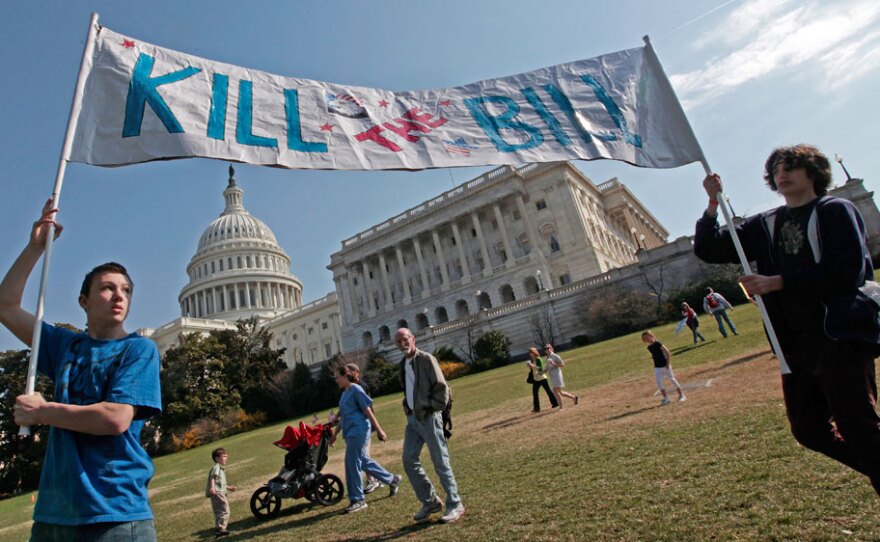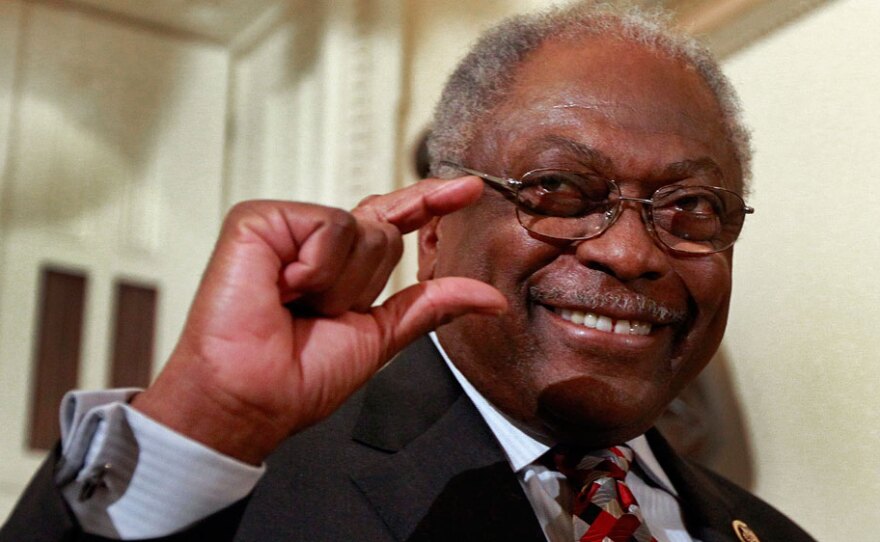As the House debate on the health bill heads into late evening, the rhetoric is just as divided along partisan lines as the final vote will be.
Democrats appear confident that they will have the 216 votes needed to pass a pair of bills designed to provide near-universal health insurance coverage. Republicans, who are unanimous in their opposition, have described the bills as "a disgrace."
The quest for widespread health care coverage has gone on for a century. Democrats are highly aware that they are about to prevail on a historic vote, making references to past landmark legislation such as Social Security and figures such as Martin Luther King Jr.
"I'm proud to be a member of Congress, but never as proud as I am tonight," said Eliot Engel (D-NY).
Democrats are highlighting the bill's prospects for reducing the deficit, lowering prescription drug prices for Medicare patients and expanding coverage to millions of uninsured Americans.
Republicans are blasting the bill for being overly ambitious and too expensive.
"Never before in our history has a major change in legislation been made on a purely partisan basis," said John Shadegg (R-AZ). "Mark my words, the massive expansions of Medicaid in this bill will bankrupt our states."
They are criticizing it for increasing taxes and expanding the reach of the federal government. They also say that the executive order President Obama plans to sign if the legislation is enacted to placate abortion opponents will not stop the expansion of abortion using federal dollars.
The executive order would clarify that no taxpayer dollars would be spent on abortions. That prompted Rep. Bart Stupak (D-MI) and a half-dozen of his allies to announce they would vote for the pair of bills (HR 3590, HR 4872) later Sunday.
"This bill was going to go forward," Stupak said. "I do believe they had the votes."
Republican Opposition
Every vote counts for Democrats. When the House voted on its version of the health care bill in November, 39 Democrats voted against it. This time, House Democrats can only afford to give up 37 votes if they hope to achieve a majority of 216 votes.
No Republicans will support this legislation. If it passes, the GOP pledges to make it the top campaign issue in this fall's midterm elections. "Let's see who's still here after the American people speak loud and clear this November," Rep. Connie Mack (R-FL) said during floor debate.

The GOP has made good on its intentions to set up procedural roadblocks before the bill was even formally up for debate. By mid-afternoon Sunday, Republicans had so far raised two motions arguing that the bill violates House rules regarding earmarks and unfunded mandates on states and localities.
"This bill is the mother of all unfunded mandates," said Paul Ryan (R-WI), the ranking Republican on the House Budget Committee.
Both points of order were defeated on mostly party-line votes.
Following the procedural wrangling, the House is nearing debate on the legislation itself. The House will first take up legislation that had been passed by the Senate on Christmas Eve.
If the House passes that bill, it will be cleared for Obama to sign into law. The House would then take up the so-called reconciliation bill, which is, in essence, a package of amendments to the Senate bill. That reconciliation package then goes to the Senate for approval.
'Kill The Bill'
Early debate took place against a backdrop of protest inside and outside the Capitol. A group of Republican lawmakers unfurled from a Capitol balcony a Gadsden flag, emblazoned with the slogan "Don't tread on me." Numerous protesters displayed the flag as well.
Capitol Police removed a small number of protesters from the House gallery after they broke in, chanting "kill the bill." At least two were restrained with zip-tie handcuffs.

Some Republican members cheered the protesters on from the House floor. "I've never seen members of the House cheering on a guy resisting being kicked out of the chamber," Rep. Barney Frank (D-MA) told TalkingPointsMemo. "It's a dangerous situation, and the Republicans are cheering him on."
Bill supporters were in evidence also. Mary Narayan, a registered nurse, told NPR's Julie Rovner, "I am in support of this bill because I feel everyone has a right to health care, just as they have a right to education and a right to live."
Inside The Bill
The reconciliation bill aims to extend health insurance to 32 million more Americans — leaving just 5 percent of the nation's nonelderly population without coverage. The bill would achieve this by expanding Medicaid and by requiring most individuals to buy insurance.
Most of the bill's $940 billion price tag comes from subsidies to help individuals pay for insurance. Subsidies are larger under the reconciliation bill than under the Senate version, but the subsidy would not grow as much over time.
The Congressional Budget Office on Saturday estimated that the reconciliation bill would reduce the deficit by $143 billion over the next decade. That's an increase of $5 billion in savings from the CBO's estimate on Thursday, reflecting changes that would be made through a "manager's amendment."
Critics of the bill say that such savings are largely illusory, as they are dependent on tax increases and spending cuts scheduled years out that could be repealed before taking effect.
The Senate bill includes an excise tax on so-called Cadillac plans worth more than $23,000 of coverage for a family of four, beginning in 2013. Couples earning more than $250,000 would pay additional Medicare taxes.
The reconciliation bill delays the start of the Cadillac tax for an additional five years but increases its bite after 2018.
Both bills call for Medicare cuts of more than $500 billion, but Congress has often blocked scheduled Medicare cuts in the past.
Individuals and small businesses could buy coverage that meets new federal standards through 50 insurance exchanges, which would be run by the states. Medicaid, the joint federal-state program that provides coverage to the poor and disabled, would be expanded to cover everyone earning less than 133 percent of the federal poverty level.
In answer to budget concerns of states, the reconciliation bill would increase the federal share of the cost of covering new enrollees. Both versions of the legislation would also address the so-called doughnut hole that leaves many Medicare recipients on the hook for prescription drug costs, although in slightly different ways.
Both bills require all citizens to have some form of health insurance. Under the Senate, individuals must buy insurance by 2016 or pay fines — $750 or 2 percent of income, whichever is greater. The House reconciliation bill shifts those numbers to $695 or 2.5 percent of income.
The Senate bill requires companies with 50 or more employees to help pay the cost of insurance if taxpayers are primarily footing the bill for their workers' coverage. The reconciliation bill would charge firms of that size $2,000 annually per employee if they don't provide coverage, while offering an exemption to some businesses on the first 30 employees.
Copyright 2022 NPR. To see more, visit https://www.npr.org. 9(MDAzMjM2NDYzMDEyMzc1Njk5NjAxNzY3OQ001))






